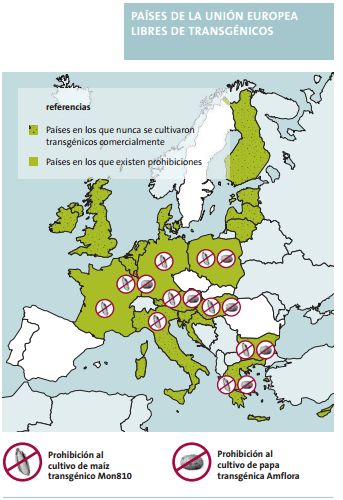19 countries in the European Union have banned GM crops from their fields following citizen petitions that spread across Europe due to environmental issues. [1].
Slovenia, Malta, Luxembourg, Denmark, Bulgaria, Germany, Cyprus, Latvia, Greece, Croatia, France, Austria, Hungary, Poland, the Netherlands, Lithuania and Italy have banned several already approved genetically modified crops. Regions such as Wallonia (Belgium) and Northern Ireland, Wales and Scotland (United Kingdom) have also done so.
The European Parliament has approved legislation allowing European Union (EU) countries to restrict or ban crops containing genetically modified organisms (GMOs) on their own territories.
The European Union plenary accepted the requests for a ban on cultivation after
The EU Environment Committee, headed by Stavros Dimas, presented a report stating that the cultivation of these genetically modified corns could harm butterflies and other beneficial insects, as well as modify the food chain and generate disturbances in aquatic biology.
This struggle, which in many cases united producers with consumers, took more than four years.
“There has never been a clearer signal that genetically modified crops and foods, and the companies that market them, are not welcome. The Spanish government cannot ignore the will of the whole of Europe, even though it is the country in the European Union that sows the most GMOs each year. It must follow the steps of the rest of Europe and ban genetically modified crops to protect organic farming and move towards another agricultural model,” said Liliane Spendeler, director of Friends of the Earth, regarding the Iberian country, which together with Portugal and to a lesser extent the Czech Republic are the only ones that have authorised the sowing of MON810 from the multinational Monsanto.
This important joint decision, mostly by the European community, contrasts with the intention of countries in Latin America that will surely suffer growing pressure from the lobby of companies interested in implementing transgenic crops, once a large area of cultivation is prohibited, compromising to varying degrees the economic interests invested in these technologies. Among them is Ecuador.
Grades:
[1] European Commission, Request for Authorisations to restrict GM crops, demands of Member States: http://ec.europa.eu/food/plant/gmo/new/authorisation/cultivation/geographical_scope_en.htm[2] 26: Article 26 of Directive (EU) 2015/412“From 2 April 2015 until 3 October 2015, Member States may request that the geographical scope of a notification or application submitted, or an authorisation granted, under this Directive or Regulation (EC) No 1829/2003 be adapted before 2 April 2015. The Commission shall without delay forward the Member State's request to the notifier or applicant and to the other Member States.” http://eur-lex.europa.eu/legal-content/ES/TXT/PDF/?uri=OJ:JOL_2015_068_R_0001&from=PL
Slovenia, Malta, Luxembourg, Denmark, Bulgaria, Germany, Cyprus, Latvia, Greece, Croatia, France, Austria, Hungary, Poland, the Netherlands, Lithuania and Italy have banned several already approved genetically modified crops. Regions such as Wallonia (Belgium) and Northern Ireland, Wales and Scotland (United Kingdom) have also done so.
The European Parliament has approved legislation allowing European Union (EU) countries to restrict or ban crops containing genetically modified organisms (GMOs) on their own territories.
The European Union plenary accepted the requests for a ban on cultivation after
The EU Environment Committee, headed by Stavros Dimas, presented a report stating that the cultivation of these genetically modified corns could harm butterflies and other beneficial insects, as well as modify the food chain and generate disturbances in aquatic biology.
This struggle, which in many cases united producers with consumers, took more than four years.
“There has never been a clearer signal that genetically modified crops and foods, and the companies that market them, are not welcome. The Spanish government cannot ignore the will of the whole of Europe, even though it is the country in the European Union that sows the most GMOs each year. It must follow the steps of the rest of Europe and ban genetically modified crops to protect organic farming and move towards another agricultural model,” said Liliane Spendeler, director of Friends of the Earth, regarding the Iberian country, which together with Portugal and to a lesser extent the Czech Republic are the only ones that have authorised the sowing of MON810 from the multinational Monsanto.
This important joint decision, mostly by the European community, contrasts with the intention of countries in Latin America that will surely suffer growing pressure from the lobby of companies interested in implementing transgenic crops, once a large area of cultivation is prohibited, compromising to varying degrees the economic interests invested in these technologies. Among them is Ecuador.
Grades:
[1] European Commission, Request for Authorisations to restrict GM crops, demands of Member States: http://ec.europa.eu/food/plant/gmo/new/authorisation/cultivation/geographical_scope_en.htm[2] 26: Article 26 of Directive (EU) 2015/412“From 2 April 2015 until 3 October 2015, Member States may request that the geographical scope of a notification or application submitted, or an authorisation granted, under this Directive or Regulation (EC) No 1829/2003 be adapted before 2 April 2015. The Commission shall without delay forward the Member State's request to the notifier or applicant and to the other Member States.” http://eur-lex.europa.eu/legal-content/ES/TXT/PDF/?uri=OJ:JOL_2015_068_R_0001&from=PL
![]()

